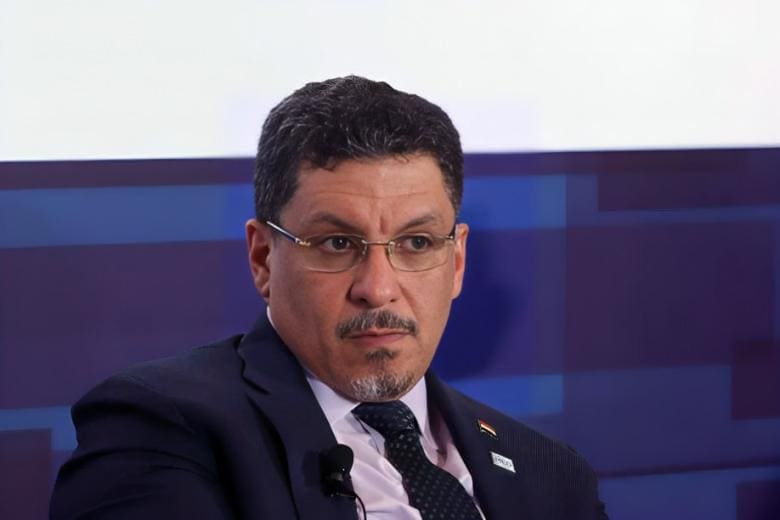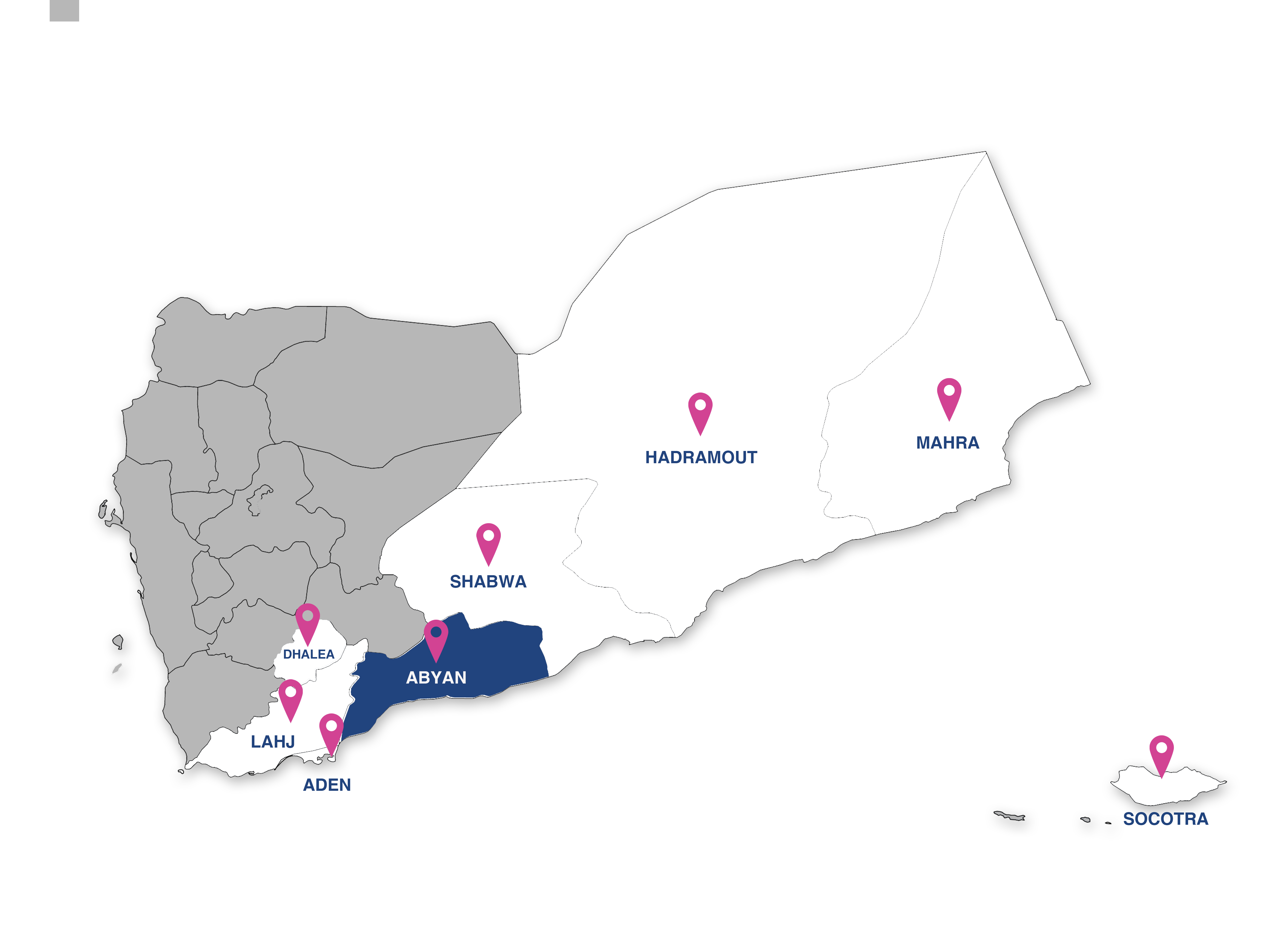
Yemeni Prime Minister Ahmed Awad bin Mubarak, April 9, 2023 (Middleeastmonitor)
Last updated on: 13-06-2024 at 3 PM Aden Time

Many people are pinning their hopes on Bin Mubarak's success, which hangs by a thin thread, teetering on the brink of failure.
Abdullah Al-Shadli (South24)
On February 4, 2024, former Yemeni Foreign Minister, Ahmed Bin Mubarak, was appointed Prime Minister of the internationally recognized government, succeeding Maeen Abdulmalik Saeed. This followed weeks of discussions within the Presidential Leadership Council (PLC), the highest political authority in the country, about the proper figure to succeed Abdulmalik, who has led two governments since 2018 and has been accused of corruption and failure.
Following his appointment, Bin Mubarak arrived in the capital, Aden, where he conducted a series of field visits to medical, administrative, and civil governmental facilities to assess their operations. He also issued important and well-received directives, including establishing a ‘tender committee’ for purchasing fuel for electricity-generating plants on February 18, and policies that reduce the costs of Yemeni diplomatic missions abroad.
Despite Bin Mubarak’s strong start, the fundamental issues on which he was expected to progress are still the same, if not worse. For example, throughout May, Aden witnessed daily power outages lasting over 20 hours due to a lack of fuel.
Related: The Priorities of the New Yemeni Government
Additionally, the monthly salaries of soldiers for April were delayed until early June, despite the relatively regular disbursement of salaries over the past two years. Furthermore, the local currency has dropped to its lowest value in history, with one US dollar now equivalent to 1750 Yemeni riyals, leading to a surge in the price of basic food products.
Considering these developments, do the past few months serve as proof of Bin Mubarak’s failures as Prime Minister? Is it too early to pass judgment on his reforms, which might require more time to yield results? Do the broader circumstances constitute another new challenge that he should address?
Heavy legacy
On May 16, during a TV interview with Yemen’s satellite channel, Bin Mubarak criticized the previous government’s leadership for mismanaging the country’s electricity crisis. He alluded to regular corruption deals regarding the purchase of diesel and mazut for operating both the governmental and rented plants.
Bin Mubarak said: “1.01 trillion Yemeni riyals were spent on the electricity sector last year, 70% of which were allocated to purchasing fuel, yet no substantial solution to the problem has been reached”.
He added that “the former government used to buy one ton of fuel for about 1200$ without conducting fair tenders. Today, since the establishment of the tender committee, one ton is bought for only 700$,”.
Bin Mubarak indicated that 31% of the state’s revenues are consumed by electricity costs. He emphasized that these substantial sums would be enough to establish strategic power plants, thereby halting the ongoing drain on revenues. He urged people to be patient as sustainable and well-planned solutions are implemented.
On May 28, during the main dialogue session of the Arab Media, held in Dubai, about the future of Yemen, Bin Mubarak discussed the direct and disastrous impacts of the Houthi attacks on oil facilities in October and November 2022, which have halted oil and gas exports, depriving the government of more than 70% of its revenues.
He also discussed the economic ramifications of the Houthi attacks on commercial ships in Bab Al-Mandab, adding that the escalation is increasing the costs of shipping food and fuel to Yemeni ports.
Considering these factors as a whole, it can be said that Bin Mubarak has inherited a legacy heavy with corruption and poor management, which should not be underestimated. However, the fact that he was part of the previous government makes talking about all these factors less logical. Furthermore, some believe that Bin Mubarak has not yet made tangible achievements.
Journalist Motea Bamuzahem told South24 Center, “So far, there has been no tangible move by the Prime Minister in the service domain, the foremost of which is electricity. This is despite the transparency of his vision about the corruption of the former government”.
He added, “The issues of currency, price control, and salaries haven’t experienced any changes since Bin Mubarak took office”. However, Bamuzahem acknowledges that it may currently be too early to judge his success in these areas, although according to him, the indications aren’t so promising.
Failure?
Political researcher Mahmoud Al-Taher believes that “Bin Mubarak has so far failed in his tasks as Prime Minister and hasn’t met expectations or made any tangible progress in different fields”.
He also told South24 Center, “Bin Mubarak has failed to advance political and military matters. He hasn’t made any progress in addressing the accumulated issues in the service, economic, and social sectors”.
Al-Taher said that “Bin Mubarak's decisions to disallow foreign visits of all ministers and their deputies haven't been respected in reality. He was seen, himself, traveling abroad to attend events unrelated to any governmental activities, such as his attendance at the Dubai Press Club”.
Imperative obligations
Regardless of the size of the challenges, the government still faces imperative obligations that can't be avoided, the foremost of which is salary payment, according to economic expert Dr. Mohammed Al-Kasadi. He believes that “the government should refrain from paying unnecessary foreign costs and establish a database for contracted employees. This will enable it to ensure there are no dual or non-deserving employees”.
Al-Kasadi classified the latest measures by the Aden Central Bank of Yemen (CBY) as part of the “excellent” economic reforms under Bin Mubarak’s tenure. He added: “I hope that the outcomes of these decisions will touch the people's tough reality. However, also on the financial side, Bin Mubarak must push toward transferring all revenues and taxes to the Aden CBY”.
Political analyst Abdulsalam Al-Athori believes that administrative reforms and combatting corruption should move forward despite the significant political and economic challenges facing Bin Mubarak as Prime Minister. He told South24 Center, “The Yemen crisis is still among the worst globally, with millions of people suffering from hunger, malnutrition, and diseases. This imposes additional duties”.
Required moves
Journalist Bamuzahem believes “the Prime Minister should activate a Financial Disclosure Form”, which officials use to disclose their wealth the moment they take office. “He must apply it to himself first before imposing it on his ministerial team, in order to be followed by others. There should be no exceptions for any officials or businessmen, regardless of their status or position. This would serve as the first move to reduce corruption and illicit wealth”.
Bamuzahem added: “Bin Mubarak has to start combating corruption from top to bottom if he wants to make a qualitative move in the area of economic reform, along with selecting technocrats who are specialized in their fields. He also needs to move faster on improving the service and economic situation, as well as determining solutions that suit existing capabilities”.
Accordingly, many people are pinning their hopes on Bin Mubarak's success, which hangs by a thin thread, teetering on the brink of failure. When talking about the challenges that face Bin Mubarak, his merits shouldn't be ignored, including his strong ties with Saudi Arabia, the United States, and Europe. This is in addition to his positive relationships with the internal political parties as part of Yemen's legitimacy camp.

2 Month ago